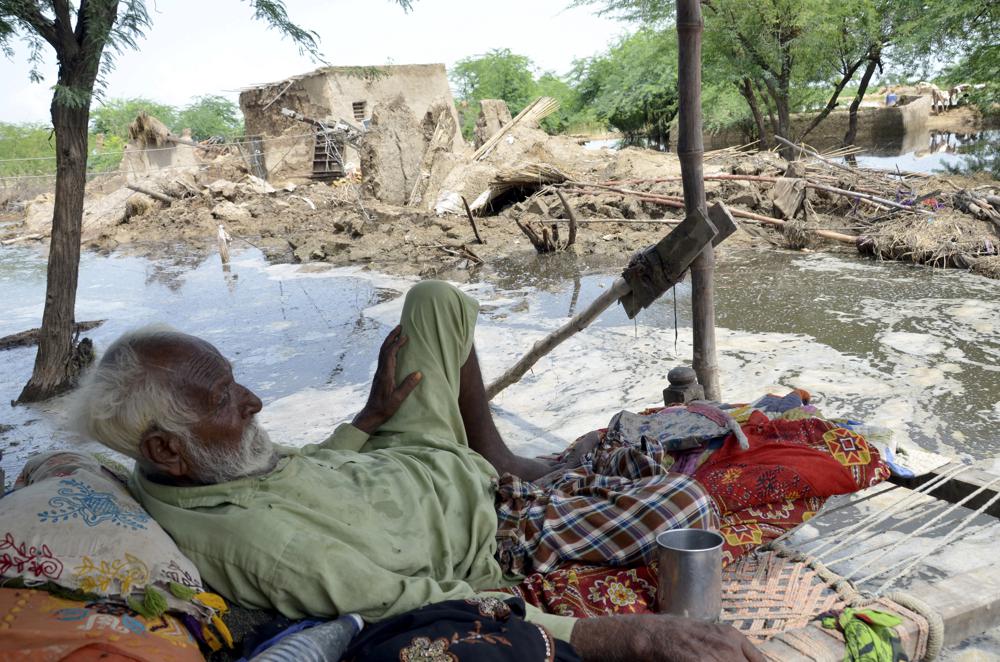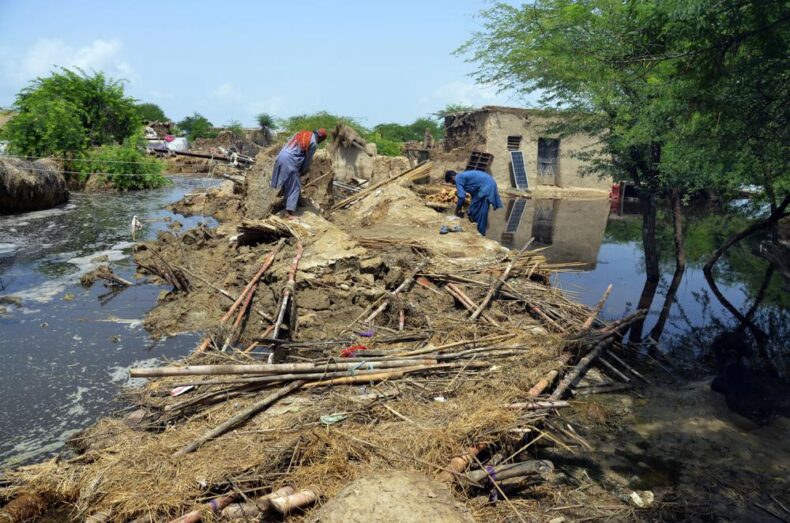Officials also referred to the deadly monsoon season as “a terrible climate calamity,”
Saying it has caused more than 1,000 fatalities in Pakistan since mid-June as a result of severe flooding. While the army and rescuers relocated stranded residents to safety in relief centres and fed thousands of displaced Pakistanis, flash floods brought on by the monsoon rains destroyed villages and crops.

Since mid-June, there have been more than 1,000 fatalities in Pakistan as a result of extensive floods, according to officials, who also described the deadly monsoon season as “a catastrophic climate calamity.” While army and rescue personnel moved stranded civilians to safety in relief camps and gave food to thousands of displaced Pakistanis, flash floods caused by the torrential rains wiped away villages and crops.
According to Pakistan’s National Disaster Management Authority, new fatalities were reported in Khyber Pakhtunkhwa and southern Sindh provinces, bringing the total number of deaths since the monsoon season started earlier this year, mid-June — to 1,033.
Pakistan is undergoing a “severe climate crisis, one of the harshest in the decade,” according to Sherry Rehman, a lawmaker and the nation’s top climate official, in a video uploaded on Twitter. “The monster monsoon of the decade is wreaking non-stop havoc throughout the country,” she said.
“We are at ground zero of the front line of extreme weather events, in an unrelenting cascade of heatwaves, forest fires, flash floods, multiple glacial lake outbursts, flood events, and now the monster monsoon of the decade is wreaking non-stop havoc.”
The nation’s envoy to the EU tweeted about the on-camera declaration on climate calamity.
Tens of thousands of people have been relocated from their houses to relief camps put up in government facilities in northern Khyber Pakhtunkhwa province due to flooding from the Swat River overnight, particularly in the Charsadda and Nowshehra districts. According to Kamran Bangash, a representative for the province government, many people have also sought refuge on the sides of roadways.
According to Bangash, about 180,000 residents of Charsadda and 150,000 residents of the villages in the Nowshehra area were evacuated in this climate calamity.
Without a connection to the climate minister, Khaista Rehman, 55, sought refuge on the side of the Islamabad-Peshawar highway with his wife and three children after discovering that their Charsadda home had been inundated the previous night. We are currently safely on this road pretty high from the inundated region, thank God, he said. “Our crops have been lost, and our house has been damaged, but I thank Allah that we are still alive, and I will begin a new life with my sons.”
Each of the nation’s four provinces has been impacted by the unusual monsoon season. Millions of people have been affected by extensive power outages, which have destroyed up to 300,000 dwellings, the impassibility of many highways, and other factors.
On Sunday, Pope Francis said he wished to reassure the people of Pakistan that he was “near to them” following the catastrophic flooding there. Francis said he was praying “for the numerous victims, for the injured and the displaced, and so that international solidarity will be fast and generous” while on a pilgrimage to L’Aquila, an Italian town devastated by a catastrophic earthquake in 2009. Rehman said when the rains stop, “we could very well have one-fourth or one-third of Pakistan under water.”
Rehman made this statement to the Turkish news source TRT World. The need for more significant planning and sustainable development on the ground is evident, given that this is a global challenge. She said that our buildings and crops will need to be climate-resistant.
Rehman stated to BBC News hour in May that the country was seeing harsh weather in both the north and south due to rising temperatures. Therefore, we are currently witnessing what is known as glacial lake outburst floods in the north, which are common because Pakistan has the most glaciers outside of the polar zone. To assist civilian authorities in rescue and relief efforts around the nation, the government has sent soldiers on duty.
Gen Qamar Javed Bajwa, head of the military, travelled to southern Sindh province’s flood-affected districts to speed up relief efforts. Twenty-two tourists who were stranded in a valley in the north of the country were flown to safety, according to a statement from the Pakistani army.
By Harsha Josephine Antony | On Sun 28 Aug 2022 | 7.40 pm IST |













